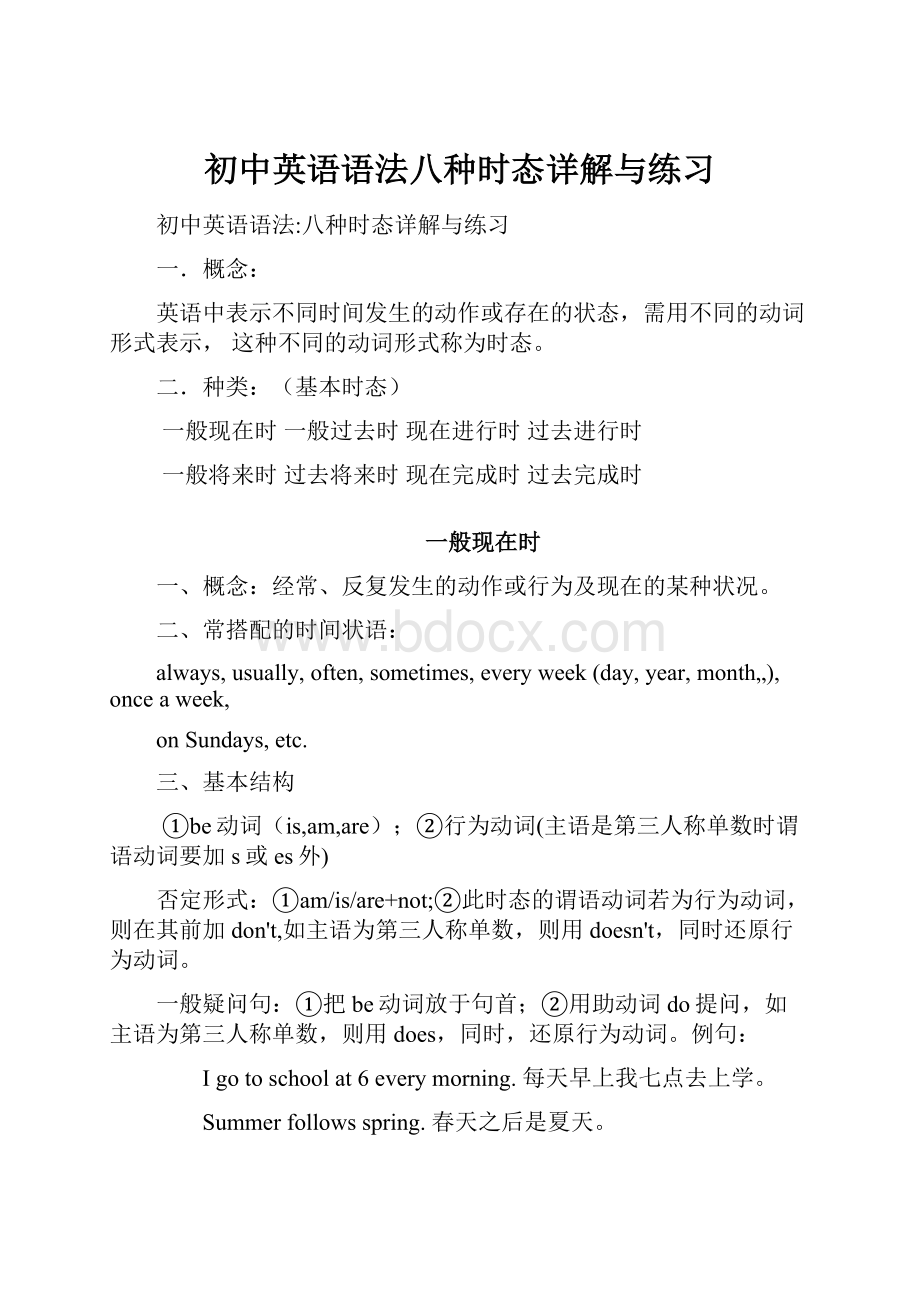初中英语语法八种时态详解与练习Word文件下载.docx
《初中英语语法八种时态详解与练习Word文件下载.docx》由会员分享,可在线阅读,更多相关《初中英语语法八种时态详解与练习Word文件下载.docx(38页珍藏版)》请在冰豆网上搜索。

例句:
Igotoschoolat6everymorning.每天早上我七点去上学。
Summerfollowsspring.春天之后是夏天。
IlearnedthattheearthgoesaroundthesunwhenIwasinprimaryschool.我在小学就学过地球是围绕太阳转的。
Pridegoesbeforeafall.骄者必败。
四、基本用法:
1)描述当前时间内经常出现、反复发生的动作或存在的状态。
在这种情景中,句子常带有表示频率的时间状语:
always,everyday,often,onceaweek(month,year,etc.),sometimes,seldom,usually等等,以表示句中的动作或状态是习惯性的、经常性的。
例如:
Theyraiseducksasasideline.他们以养鸭为副业。
Shedoesn'
toftenwritetoherfamily,onlyonceamonth.她不常给家里写信,仅一月一封而已。
Icycletoworkeveryday.我每天骑自行车上班。
Itseldomrainshere.这儿很少下雨。
2)仅为了描述状态、性质、特征、能力等等。
这里的目的是为了"
描述现阶段的动作或状态"
,其重点"
不是强调动作发生的时间、或进行的状态"
。
Hecanspeakfiveforeignlanguages.他能说五种外语。
Thatisabeautifulcity.那是座美丽的城市。
ChangjiangRiverisoneofthelongestriversintheworld.长江是世界上最长河流之一。
Shemajorsinmusic.她主修音乐。
Allmyfamilylovefootball.我全家人都喜欢足球。
(强调每个家人)
Mysisterisalwaysreadytohelpothers.我妹妹总是乐于助人。
3)陈述客观事实、客观真理。
顾名思义,客观的情况是"
没有时间概念"
的;
也"
不会在意动作进行的状态"
Theearthgoesaroundthesun.地球绕着太阳转。
Tenminustwoiseight.十减二等于八。
Lighttravelsfasterthansound.光的速度比声音的速度快。
TheUnitedStatesliesbythewestcoastofthePacificOcean.美国位于太平洋西岸。
4)根据英文语法规定,当主句的谓语动词是一般将来时,那么时间或条件状语从句的谓语动词只能用一般现在时来表示将来要发生的动作。
I'
lltellhimthenewswhenhecomesback.他回来时,我将告诉他这个消息。
Ifyoutakethejob,theywilltalkwithyouingreaterdetails.
如果你接受这份工作,他们将和你谈谈细节。
用于一般现在时的副词,除了上面提到的一些表示频率的词以外,常见的还有:
now,today,nowadays等等。
练习题:
用动词的适当形式填空:
1.Why__________Tomabsenttoday?
(be)
2.Mike________(go)toschoolatseveninthemorning.
3.Mymother________(like)______(go)shopping.
4.Ican________(draw)manybeautifulpictures.
5.Doeshe_________(like)_________(jump)?
6.Thestudents___________(speak)Englishinclass.
7.Thestudent_________(speak)Chineseafterclass.
8.Let'
s____________andplayfootball.(go)
9.He_____________likeswimming.(not)
10.__________yoursisterstudyEnglishatschool?
No,she__________.(do)
用所给动词的适当形式填空:
1.I______________(write)toyouassoonasI_______(get)toLondon.
2.Hedoesn'
tfeelwelland____________(noteat)anyfoodthismorning.
3.He______not_______(see)mecomein,forhe___________(read)somethingwithgreatinterest.
4.Don'
tmakeaniose.Grandpa__________(sleep).
5.It________(take)metwohourstofinishmyhomeworklastnight.
6.What______yourmother_______(do)ateightyesterdayevening?
She_______(wash)clothes.
7._______it_________(rain)whenschoolwasoveryesterday?
8Theteachertoldustheearth__________(move)roundthesun.
单项选择:
1.ThestudentswillgototheSummerPalaceifit_____tomorrow.
A.don'
trainB.doesn'
trainC.won'
train
3.Thepicture_______nice.
A.looksB.islookedC.lookD.islooking
4.She______downandsoonfellasleep.A.liveB.lainC.laidD.lay
6.WeshallgotoShanghaionbusinessbeforeyou_____backnextweek.
A.wilcomeB.cameC.wouldcomeD.come
7.Don'
tsmokeuntiltheplane______off.A.takesB.tookC.wastakenD.istake
8.Isawher____theroomthismorning.A.toenterB.enteredC.enterD.enters
11.Hetoldus______ateight.A.workingB.toworkC.workD.worked
12.You'
dbetter______athomeand______yourhomework.
A.tostay,doB.stay,doC.tostay,todoD.stay,todo
14.UncleWangknows_______awashingmachine.
A.howtomakeB.tomakeC.howmakingD.whattomake
15.Jimdecided_______PollytoLingFengwhenhewasbacktoEngland.
A.toleaveB.leftC.leavingD.leave
4)改句子
1.Wehavefourlessons.(否定句)
2.Ihavemanybooks.(改为否定句)
3.GaoShan'
ssisterlikesplayingtabletennis(改为否定句)
4.ShelivesinasmalltownnearNewYork.(改为一般疑问句)
5.IwatchTVeveryday.(改为一般疑问句)
6.Davidhasgotagoal.(改为一般疑问句)
7.Wehavefourlessons.(否定句)
8.Tomdoeshishomeworkathome.否定句:
一般疑问句:
划线提问
9.IusuallyplayfootballonFridayafternoon.否定句:
一般过去时
过去某个时间里发生的动作或状态;
过去习惯性、经常性的动作、行为。
ago,yesterday,thedaybeforeyesterday,lastweek(year,night,month„),in1989,justnow,attheageof5,oneday,longlongago,onceuponatime,etc.
三、基本结构:
①be动词的过去式(was/were);
②行为动词的过去式(即在动词原形后加ed,不规则变化的动词除外)
①was/were+not;
②在行为动词前加didn'
①was或were放于句首;
②用助动词do的过去式did提问,同时还原行为动词。
一般过去时用谓语动词的过去式构成,即在动词原形后加ed,不规则变化的特殊动词除外。
Hewasherejustnow.他刚才还在这里。
Whatdidyoudoyesterday?
你昨天做了什么事?
Weoftenplayedtogetherwhenwewerechildren.我们小时候常在一起玩。
Heusedtosmokealot,buthedoesn’tnow.他过去经常抽烟,但现在不抽了。
四、基本用法
主要是用来描述在过去某个时候发生的动作或存在的状态。
它也可以用来表示在过去某段时间里经常发生的习惯性动作。
这一点在表达意义上与一般现在时相同,只是所在的时间区域不同而已。
由于它的主要作用如此,所以在使用一般过去时的句子里常常有一个意义较具体的过去时间状语。
这也是它与现在完成时的最大区别之一。
常和一般过去时连用的过去时间状语有:
lastnight(week,month,year,century,etc.),yesterday,thedaybeforeyesterday,yesterdaymorning(afternoon,evening),in1999,twohoursago(oneweekago,treeyearsago,…)等等。
使用一般过去时,在某种意义上说就是要强调动作或状态发生或存在于过去的某个时候。
"
过去"
的时间概念有两层意思:
一是指"
现在某个时间"
以前的时间;
二是指"
说话、写文章的那个时间点"
以前的时间,在这个意义上,"
现在的那个时间点"
是很小很小的,甚至于小到无法量化的程度。
Hegothisdrivinglicenselastmonth.他上个月拿到了驾照。
--Where'
sJim?
吉姆在哪里?
--Hejustwentout.他刚刚出去。
练习:
写出下列动词的过去式
is/am_________fly_______plant________are________drink_________
play_______go________make________do/does_________worry________
eat__________draw________put______throw________pass_______
用be动词的适当形式填空
1.Thelittledog_____twoyearsoldthisyear.
2.She_______happyyesterday.
3.They_______gladtoseeeachotherlastmonth.
4.Today_____thesecondofJune.Yesterday______thefirstofJune.It_____Children'
sDay.Allthestudents______veryexcited.
句型变换:
1Therewasacarinfrontofthehousejustnow.
否定句:
__________________________________________________________
一般疑问句:
肯定回答:
否定回答:
2Theyplayedfootballintheplayground.
否定回答:
1.I______(watch)acartoononSaturday.
2.Herfather_______(read)anewspaperlastnight.
3.It____(be)the2ndofNovemberyesterday.MrWhite___(go)tohisofficebycar.
4.______you_______(visit)yourrelativeslastSpringFestival?
5.GaoShan________(put)thebookonhisheadamomentago.
6.Don'
t______thehouse.Mum_______ityesterday.(clean)
7.What_________she_________(find)inthegardenlastmorning?
She_________(find)abeautifulbutterfly.
8.What_________you______justnow?
I_______somehousework.(do)
9Weall_________(have)agoodtimelastnight.
10.Shelikes_________newspapers,butshe_________abookyesterday.(read)
11.He___________footballnow,butthey_______basketballjustnow.(play)
句型转换:
1、Lucydidherhomeworkathome.
(改否定句)Lucy______________________herhomeworkathome.
2、Hefoundsomemeatinthefridge(冰箱).(变一般疑问句)
___________he_____________________meatinthefridge?
3、Shestayedthereforaweek.(对划线部分提问)
_______________________________she__________there?
4、Therewassomeorangeinthecup.(变一般疑问句)
_________there___________orangeinthecup?
中译英:
1.我过了一个忙碌但却刺激的周末。
I______________________________________excitingweekend.
2Jenny喜欢看书。
昨晚她看了一本英语书。
Jennylikes___________________.She_________anEnglishbooklastnight.
3.Emma每天都看电视。
可是昨天他没有看。
Emma__________TVeveryday.Buthe____________________yesterday.
4.上周六他们做什么了?
他们做作业和购物了。
What________they__________________Saturday?
They___________________homeworkand___________________.
一般将来时
表示将要发生的动作或存在的状态及打算、计划或准备做某事。
二、时间状语:
tomorrow,nextday(week,month,year„),soon,inafewminutes,by„,the
dayaftertomorrow,等。
①am/is/are/goingto+do;
②will/shall+do.
①was/were+not;
②在行为动词前加didn'
①be放于句首;
②will/shall提到句首。
如:
Telephonemethisevening.I’llbeathome.今晚给我打电话,我会在家。
I’ll(shall/will)doabetterjobnexttime.下次我要干得好些。
Thecarwon’tstart.车开不了啦。
Oilandwaterwillnotmix.油和水没法混在一起。
主要用来描述将要发生的动作或存在于未来的情况。
这里所说的“将来时间”是指“说话、写文章那一刻以后的时间”。
它的表示方法主要有如下几种:
1)shall/will+动词原形这种表示方法是说,动作在现在或目前还未发生,要在将来的某个时间内发生;
它没有主观性,是“纯粹的将来动作”。
Ishall/willnotbefreetomorrow.我明天没空。
Hewillarriveherethisevening.他今晚抵达这里。
2)be(am/is/are)+going+不定式
这种表示方法主要是说明A)“说话人的意图、打算”;
B)“某种可能性”。
A)HeisgoingtospendhisholidaysinLondon.他打算在伦敦度假。
Whoisgoingtospeakfirst?
谁先发言?
B)Itisgoingtorainsoon.马上要下雨了。
Ishegoingtocollectanydataforus?
他会帮我们收集资料吗?
IfyougotoNewZealand,youaregoingtoliketheplace.如果你去新西兰,你会喜欢上那个地方的。
3)be(am/is/are)+不定式表示方法描述两钟情况:
按计划安排要发生的动作,这个动作发生的时间一般不会很远;
要求或命令他人做某事。
A)Thenewbridgeistoopentotrafficinthreedays.新桥三天后通车。
ThefactoryistogointoproductionbeforeNationalDay.这